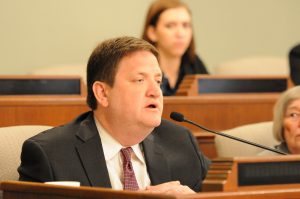New state law places limits on local board expenses
By Jean Lotus Staff reporter — August 8, 2016
State Rep. David McSweeney (R-Barrington Hills) said he was influenced by media stories about board junkets and entertainment excess at community colleges, including College of DuPage and schools and other public bodies
Taxpayer dollars can no longer be spent sending members of elected government bodies to entertainment events, such as sports games, plays and circuses, thanks to a new law signed July 22 by Gov. Bruce Rauner.
The Local Government Travel Expense Control Act (HB 4379) also limits board member expenses on travel, dining and lodging by requiring local elected boards to create a policy on these expenses and voting on them in public meetings.
The bill’s sponsor, State Rep. David McSweeney (R-Barrington Hills) said he’s always looking for ways to cut property taxes and trustee perks are a good place to “eliminate wasteful spending.”
State Sen. Tom Cullerton (D-Villa Park) sponsored the bill in the Illinois Senate. The law was unanimously approved in the General Assembly.
McSweeney said he was influenced by media stories about board junkets and entertainment excess at community colleges, including College of DuPage and schools and other public bodies.
“Right now there’s no accountability for these boards. This new law requires
[board members to produce] receipts and [hold] a public roll-call vote.”
But some say the law is too weak and hard to enforce.
Bellwood residents complained last month to the Illinois Attorney General’s office about library board travel spending and alleged Public Meetings Act violations. Freedom of Information requests showed the Bellwood Public Library travel budget for the seven-member board spiked in two years from $15,000 to $25,000. Board members were paid in advance for travel expenses with checks up to $1,500 and did not submit receipts, the records showed.
“That could pay for a lot of books,” said Friends of the Bellwood Library member Deborah Grimes.
She said the board approved its policy, so there was nothing residents could do.
“The laws are just too weak,” she said. “I’d like to petition the General Assembly to change the law to make [board members] personally accountable for the things they do. These laws only have baby teeth.”
Beginning March 1, 2017, the new law “completely eliminates entertainment expenses being paid for with tax dollars,” said McSweeney. This includes “shows, amusements, theaters, circuses, sporting events or any other place of public or private entertainment or amusement unless ancillary to the purpose of the program or event,” according to the new rules.
The law requires that boards develop a policy and publish limits for tax money spent by board members for lodging, travel and dining. If a board member plans to exceed those amounts, the expenses must be put to a vote in a public meeting. Receipts and other documentation must be open to Freedom of Information Act requests, the law says. On the municipal government level, the law only applies to trustees of non-home rule municipalities.
The Edgar County Watchdogs government group said the new law would “scale back on the lavish expenses incurred by public officials under the guise of ‘official business.’”
How big a problem is local trustee travel abuse?
Most trustees on Illinois local school boards, library boards and park districts are volunteers and don’t get paid, or if they do, they receive a small stipend. Board members sometimes travel to conferences to learn how to be better board members or get special training that can benefit their organization. The Illinois Association of School Boards offers ethics training for school board members and includes best practices on travel reimbursement.
“Keep in mind that travel on behalf of your school district should not profit you. Neither should it cost you money,” says a list of best practices on the IASB website. “A good philosophy is that you won’t benefit at the expense of the district, and the district won’t benefit financially at your expense.”
James Russell, associate executive director of IASB said the new law “ratifies the best practices of what most public school boards are already doing. The vast majority of Illinois school boards already comply with both the spirit and the letter of the new law,” he said.
But media reports show sometimes local board members go over the top with taxpayer money. In June, the Daily Southtown reported Matteson School District 159 revoked the board credit card of a trustee after the card was used for $4,600 of non-district purchases including gas and health food. The board member said his card had been stolen. Other D159 board members spent close to $52,000 of taxpayer money on travel, dining and lodging since 2012, charging the expenses on district-issued credit cards.
“Things are going to change this year,” McSweeney said. “These abuses have to stop.”
IASB’s Russell said some professional development is mandatory for school board members and districts also budget training as they can afford it. That training might include travel, lodging and meals, he said.
“Board training is about what [board members] do to become the most effective school board member,” Russell added.
In 2003, in response to Illinois Gov. George Ryan being indicted by the federal government over bribery and steering contracts charges, the state passed the Illinois State Officials and Employees Ethics Act (SOEEA or Ethics Act) and established the Office of the Executive Inspector General as an independent state agency. Some local board trustees see the new law as a way to catch up to these changes by updating their own policies. Russell said the IASB will be drafting a sample travel policy that school boards can tailor to their own districts.
McSweeney said he knew tax savings from eliminating a trustee dinner cocktail or extra hotel room was not going to significantly change the amount of property tax paid in Illinois.
“This is a small step,” he said. “It’s really about trying to change the culture.”
— New state law places limits on local board expenses —







